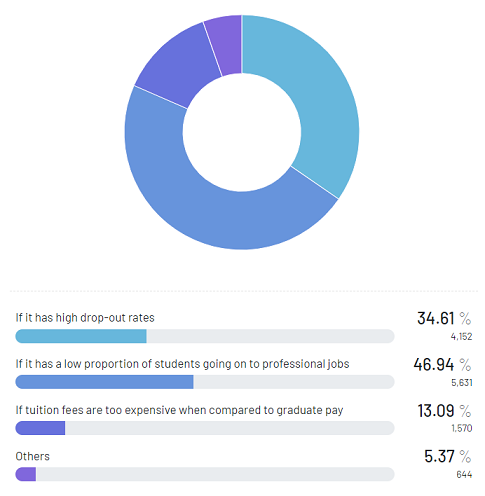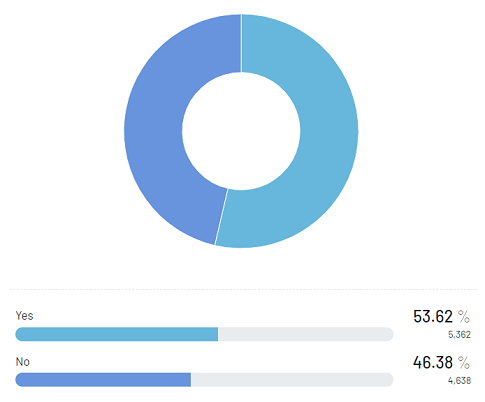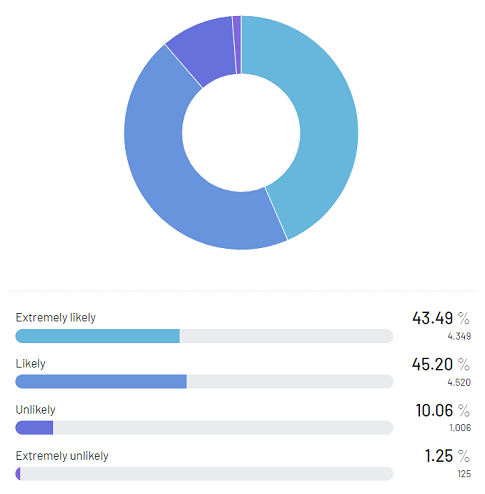 34.61% Say When Compared To Graduate Pay, Courses With Expensive Tuition Fees Is Of Poor Quality.
34.61% Say When Compared To Graduate Pay, Courses With Expensive Tuition Fees Is Of Poor Quality.The U.K. is home to some of the best universities and courses in the world. Millions of international students flock to the U.K. in the hopes of studying for a degree for an immensely rewarding future. However, too many young people are being sold a false dream and end up doing a poor-quality course at the taxpayers’ expense that doesn’t offer the prospect a decent job at the end of it. Hence, U.K. plans to restrict low-quality university courses.
The U.K. government is now cracking down on “rip-off degrees” or degrees that have a high dropout rate, don’t lead to good jobs, and leave the students burdened with high debt.
On this note, Real Research conducted a survey on U.K. limiting student enrollment in poor quality university courses.
Highlights:
- 46.94% says a university course is of poor quality if it has a low proportion of students going on to professional jobs.
- 47.91% agree that if some courses are of poor quality, they should be stopped entirely.
- 45.2% believed putting limits on underperforming degrees will mean those courses will then improve.
U.K. Limiting Student Enrollment
According to leading news portals, the U.K. government announced plans to restrict low-quality university courses. According to the Office for Students (OfS), the U.K. government’s plans to limit the number of students on courses that do not have “good outcomes” is to improve quality. Real Research launched a survey to gauge the responses of the public on “U.K. limiting student enrollment.”
The online survey app Real Research began by asking the respondents if they were aware of this decision. 30.87% replied, “Yes, I was well aware,” 31.96% said “Yes, I was vaguely aware,” and 37.17% responded, “No, I was unaware.”
Read Also: Survey on the Types of Education Systems
What People Think
Prime Minister Rishi Sunak said, “Too many young people are being sold a false dream and end up doing a poor-quality course.” Real Research asked the public about how they would measure a university course to know if it is of poor quality. At the top of the list was, “If it has a low proportion of students going on to professional jobs” at 46.94%, followed by, “If it has high drop-out rates” at 34.61%, “If tuition fees are too expensive when compared to graduate pay” at 13.09%, and “others” 5.37%.

An article from BBC says that if some courses are of poor quality, it should be stopped entirely, in line with the plans of the U.K. limiting student enrollment. “Do you agree with this statement?” Real Research asked respondents. 21.27% strongly agree, 47.91% agree, 24.76% disagree, and 6.06% strongly disagree.
Quality Of University Courses
The online survey app also asked if they thought more expensive tuition fees mean a higher quality education. 53.62% replied with “Yes”, and 46.38% said “No.”

Higher Education Minister Robert Halfon said putting limits on underperforming degrees will mean those courses “will then improve”. We asked our respondents how likely they thought that to happen. 45.20% believed it was “likely”, 43.49% said “extremely likely”, 10.06% replied “unlikely”, and 1.25% thought it was “extremely likely”.

Real Research asked the respondents if they agree with the U.K. government’s plans to limit the number of students. 45.84% responded “agree”, 23.36% said “disagree”, and 30.80% responded, “unsure”.
All-in-all, given the debate going on about the quality of courses given in universities and U.K. limiting student enrollment, changes seem likely to happen in the U.K.
Methodology | |
| Survey Title | Survey on U.K Limiting Student Enrollment |
| Duration | July 23, 2023 – July 30, 2023 |
| Number of Participants | 10,000 |
| Demographics | Males and females, aged 21 to 99 |
| Participating Countries | Afghanistan, Algeria, Angola, Argentina, Armenia, Australia, Azerbaijan, Bahrain, Bangladesh, Belarus, Benin, Bolivia,… Brazil, Brunei, Bulgaria, Burkina Faso, Cambodia, Cameroon, Canada, Chile, China, China (Hong Kong) China (Macao), China (Taiwan), Colombia, Costa Rica, Croatia, Czech Republic, Ecuador, Egypt, El Salvador, Ethiopia, Finland, France, Gambia, Georgia, Germany, Ghana, Greece, Greanada, Guatemala, Honduras, Hungary, India, Indonesia, Iraq, Ireland, Israel, Italy, Ivory Coast, Japan, Jordan, Kenya, Kuwait, Kyrgyzstan, Latvia, Lebanon, Libya, Lithuania, Malaysia, Maldives, Maluritania, Mexico, Moldova, Mongolia, Morocco, Mozambique, Myanmar [Burma], Namibia, Nepal, Nicaragua, Nigeria, Oman, Pakistan, Palestine, Panama, Peru, Philippines, Poland, Portugal, Qatar, Romania, Russia, Saudi Arabia, Serbia, Sierra Leone, Singapore, Slovakia, South Africa, South Korea, Spain, Sri Lanka, Tanzania, Thailand, Togo, Tunisia, Turkey, Turkmenistan, Uganda, Ukraine, United Arab Emirates, United Kingdom, United States, Uruguay, Uzbekistan, Venezuela, Vietnam, Yemen, Zimbabwe. |
RR Author
Real Research News is the media platform that presents insights and studies of wide-range of topics. It focuses on insights gathered from its survey app.







